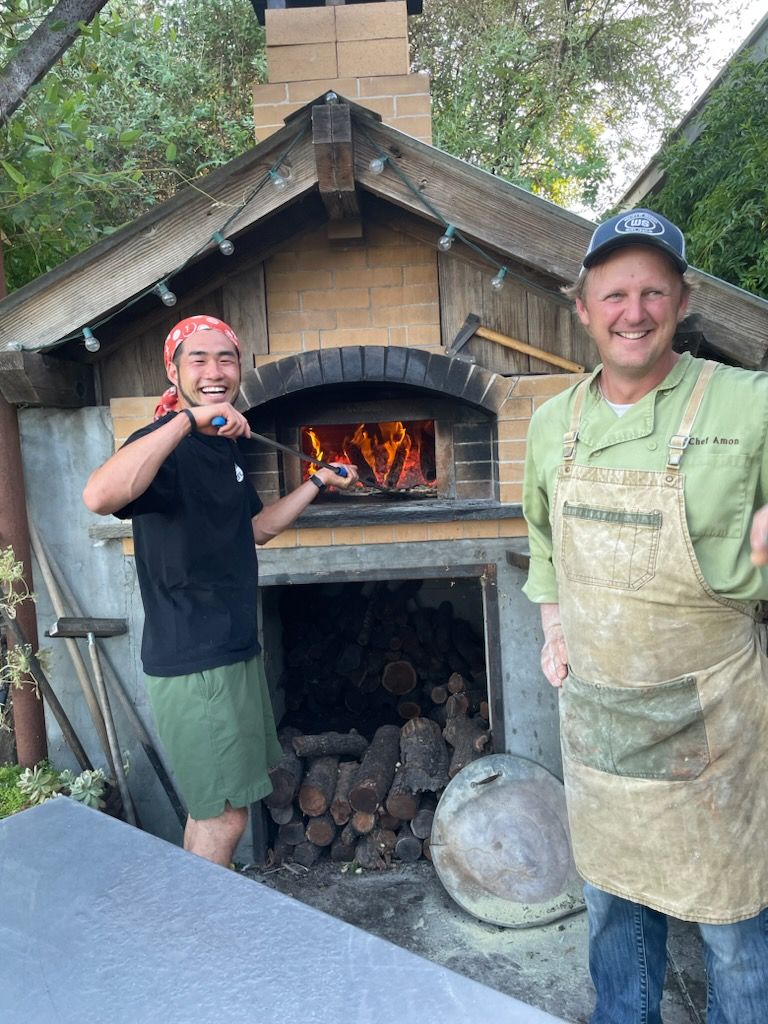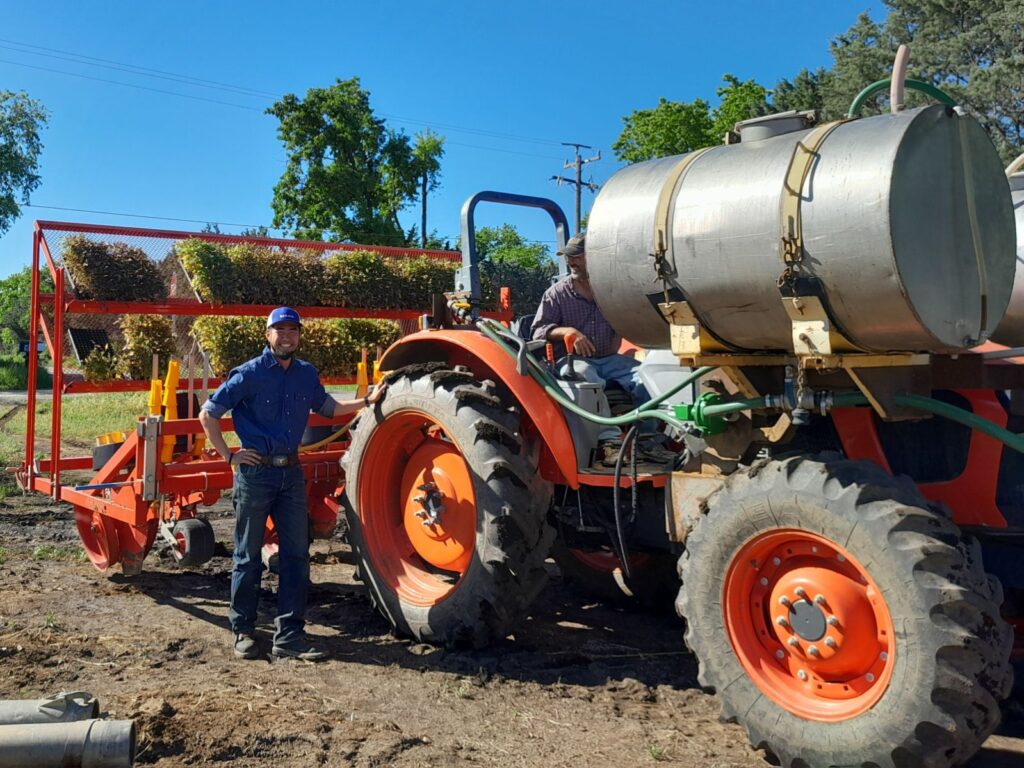
Today’s News from the Farm is an interview with Naoki Sakata, one of our interns! He is part of the 2023-2024 Japanese Agricultural Training Program cohort. He came last September and will be with us until early October when he’ll head to UC Davis for a few months of classes before heading back to Japan at the end of the year. We’ll really miss him; he’s become a key member of our truckload team and the Palo Alto farmers market squad and has formed a lot of great relationships at the farm, a testament to a lot of work on his English and Spanish. In addition to his farming and cooking skills, which we discussed during our interview, he’s got lots of other skills and hobbies that we didn’t even cover including that he plays guitar and sings and knits, which he taught himself to do last winter via YouTube so that he could make himself a hat with Full Belly yarn! He’s a real renaissance man.
Here’s our very lightly edited version of our conversation.
– Elaine Swiedler, CSA Manager
Were you around farming as a child? When did you first start farming or get interested in agriculture?
I grew up in Fukuoka and did not have farmers in my family.
I got interested in farming around age 13 or 14. Before then, I wanted to be a chef at a restaurant. I liked cooking and would cook for my family. My favorite manga was about cooking, called Cooking Papa. It gave me a lot of cooking inspiration. In one story, one of the characters wanted to be a farmer and it showed me that it is a good job and that farmers support chefs and everyone who eats food.
I decided to study agriculture in university. It was my major for 4 years at Yamaguchi University, the National College in Yamaguchi, and I focused on wheat, though I did spend a little time working with rice farmers too.
Why did you want to come to the US? How did you decide to apply to the JATP?
This is a long answer.
When I graduated from college, for two years I worked at Kubota, the tractor company. I worked as a salesman and also did in-field mechanic work. I liked the work but the hours were really long and the pay wasn’t very good.
I left that job and for almost a year, I traveled around Japan on a motorcycle doing farming. I would visit a farm, do some work with them, and then travel to another farm. Farmers I stayed with recommended other farmers to visit. I went to all 47 prefectures in Japan over nine months.
For the first three months, I visited a lot of types of farms. Rice, wheat, greenhouse, mixed vegetables, honey, tea, and fruit. About three months in, I met an organic farmer, who became a mentor. I didn’t know anything about organic before meeting him. He was a second generation farmer raising a special type of duck (aigamo) that he used for farming rice. The ducks eat the bugs and also make manure to help the crops. He grew a wide variety of vegetables too and had sort of a CSA, also made deliveries and sold to restaurants. I decided that I wanted to be like him: organic, growing diverse crops, with many markets. I want to be a farmer with a wide variety of crops so that I can make good meals as a chef! He recommended other farm friends to visit in Japan and I learned more about organic farming in the other six months. Then I went back to his farm and worked as an intern for six months before coming to the US.
During my travels, I met a farmer who had done this program and he was very positive about his experience. Before traveling around Japan, I only knew about wheat and rice farmers and didn’t know about vegetables, fruits, and animals. I saw many farms during my travels in Japan but I wanted to get more experience and I wanted to see, visit, and work at other places. I was really excited to join this program and see other types of farmers and more variety.
What kind of work have you done at Full Belly?
Some mechanic work, pest management, truckload, currently am hedging all the tomatoes. In the past, I did a lot of cultivations.
What do you like doing most?
Mechanic work. I like working with Alex, the mechanic. He is probably my best friend at the farm. He doesn’t speak English so it has really motivated me to work on my Spanish.
What’s something you still want to do at the farm?
I want to work on a tractor transmission. I want to learn how to fix it. Alex did it recently and I want to see it. Though I hope no tractors break!
Do you have any cooking goals?
I did a cooking class for the local kids and I want to do a second one. In the first class, we did tempura, rice balls, and miso soup. Next time, I’m thinking of udon or ramen.
I know you frequently make udon. Do you use our flour to make udon?
I tried, but it didn’t work! Our flour is good for regular pasta, but not udon. So I use all-purpose.
What’re your favorite Full Belly crops to eat?
Currently it’s Early Girl tomatoes and Jimmy Nardellos.
What’s something new that you tried here?
Lots of crops – I hadn’t had kale and chard! They aren’t as popular in Japan.
What’s something that surprised you in the US or at Full Belly Farm?
I was surprised that there’s so much land. Too much. It’s a very different farming style and people think about the land very differently.
I also was taught to never step on the beds and even on my first day, I saw Paul do that and was very surprised.
Japanese farmers concentrate on yield increases; I feel like that isn’t the only focus here. Yes, they are growing fruits and vegetables and animals, but Full Belly isn’t just focused on growing as much of the crop as possible. They are really focused on growing the soil and the microorganisms. And they are growing the customers. Full Belly customers are different than Walmart customers, they know about organic, and good food. Japanese customers think organic is about no pesticides. I think our customers understand what Full Belly is doing and that it is more. We educate our customers about how we grow and how we think about things. It’s very open. And Full Belly is about growing employees. There is so much diversity, people from so many countries.
Do you have plans yet for what you will do after you leave the farm?
I want to start a farm in Japan and grow mixed vegetables. Japan’s government has a new farmers program that provides loans to new farmers. I will need to contact them and start looking for land.

